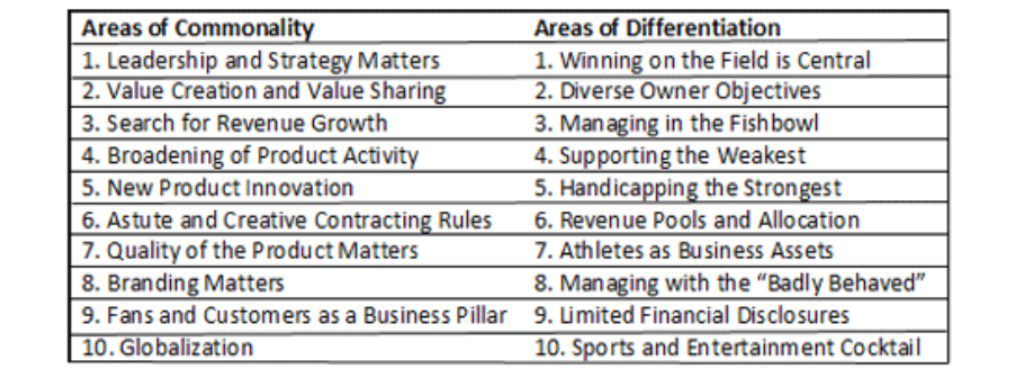IESE Insight
The playbook for sports managers
Managing in the world of sports is a high-stakes game. The media and fans are scrutinizing, and often second-guessing, leadership decisions.
From the global success of "Brand Beckham" to the remaking of the San Francisco Giants, a new textbook on sports business management analyzes what it takes to make good decisions in an increasingly sophisticated and globalized world of sports.
Sports Business Management: Decision Making Around the Globe (Routledge, 2016) is co-written by George Foster, Norm O'Reilly and Antonio Davila — professors at Stanford University, Ohio University and IESE, respectively. They combine years of experience working both for and with sports organizations, teaching and researching their topic (in meetings, in front of screens, and in stadium seats, as the case may be).
The result of all this is an instructive book about strategy, marketing, finance, decision-making and management with very real examples. Of course, smart sports business management has a lot in common with more general management, but the authors are careful to note when the sports field is special. The importance of winning, coping with bad behavior, and managing in a fishbowl are among the distinguishing features while navigating the wild world of sports.
Betting on Barry Bonds?
Back in 1992, Major League Baseball's San Francisco Giants was steadily losing money. The team's frustrated owner had decided to sell. The Giants clearly needed a new stadium. Was signing big-hitter Barry Bonds to a then record-breaking $43 million contract really the answer?
This headline-grabbing contract is analyzed as an example of good decision-making that took many stakeholders and objectives into consideration.
"We needed to jump-start the franchise," explained CEO Larry Baer, coming in with the new owners of the team. "We had to show we cared about baseball and operating the team."
To this end, management considered homerun-hitting Barry Bonds' ties to San Francisco and the Giants. His father, Bobby Bonds, was a star for the Giants and his godfather, Willie Mays, was a Hall of Fame player there. "[Barry] grew up in the clubhouse of Candlestick Park as a three- or four-year-old at the feet of his father," Baer continued. One idea behind the contract was to "bring Barry Bonds home," a gesture with "huge symbolism."
Though Bonds' image would later suffer from alleged steroids use, his 1992 contract and later renewals clearly helped boost the Giants to a new level of success. The team got a new stadium downtown, with a lot of private funding. Attendance surged, the team won, and revenues jumped as well.
Fast forward to 2007, just after Barry Bonds hit his record-breaking 756th homerun. That year, management decided not to offer their most famous player a new contract, separating the Giants and the Bonds brands.
Post-Bonds, the Giants went on to win the World Series, the highest honor in baseball — even with a relatively modest player payroll. The Giants' success can be linked to its savvy stakeholder management, with tough decisions weighed from many perspectives — from weekend fans to league leadership.
Good decisions by the book
With sponsorships, broadcast rights, apparel sales and much more at stake, how should a manager consistently make the right choice?
The book lists five key concepts:
- Objectives that are well articulated and defined
- Timeframe/horizon that is realistic
- Alternatives aggressively pursued and examined
- Constraints understood
- Uncertainty explicitly recognized
"A good decision is one where there is a consistency between the pre-set objectives and the actual objectives used to make a choice and where all available information and data were used in a consistent way to make the final choice," the authors summarize. They are careful to note that good decisions may still have negative outcomes. For example, an expensive contract may yield little if the contracted player is then injured.
Another special consideration in sports is that decision-making occurs with the media and fans watching, and perhaps second-guessing, every management move.
Soccer: The poster child for globalized sports
While many sports are increasingly global — from tennis to cricket — soccer is still the most global of them all, with all continents competing to send teams to the FIFA World Cup and fans scattered everywhere. In this realm, the book looks at marketing and more. Consider "Brand Beckham," an unprecedented marketing success.
The authors explain: "The pillars of Brand Beckham included his on-field playing ability, his playing for highly successful clubs, his looks and boyish charm, his dating and marriage to Posh Spice (Victoria Adams) of the Spice Girls and their subsequent family, and the Beckhams' role in and appearance at many society events and charities."
What do the pillars of Brand Beckham support? For starters, about 10 million Beckham jerseys sold, according to one estimate. Whether he's No. 7 on Manchester United or No. 23 for Real Madrid, Beckham jersey sales followed him wherever he went, and made a lot of money.
And in North America, as Major League Soccer struggled to win the hearts of American fans, hiring Beckham helped not only his team but his entire league gain recognition. "There's arguably not a soccer fan on this planet that doesn't know the LA Galaxy and Major League Soccer (MLS), and David Beckham played a significant role in helping us make that happen," the MLS commissioner Don Garber said.
Of course, some said Beckham's LA Galaxy contract was a spectacular waste of money, coming late in Beckham's career, but that is the nature of sports business management, dealing with decisions in a fishbowl. With high visibility and high stakes, the business of sports blends on-field and off-field considerations for managers.
Managing in the sports industry vis-à-vis managing in other industries

